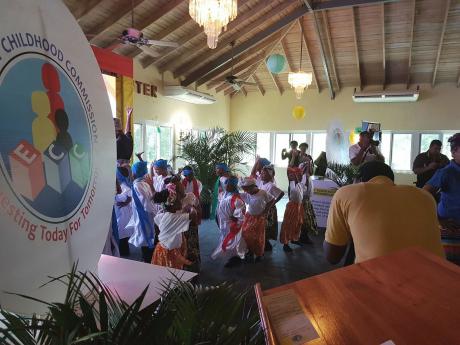The Early Childhood Commission (ECC), which has overall responsibility for child development from birth to eight years in Jamaica, is using an integrated approach to bringing all policies, standards, and regulations relating to early childhood care, education, and development under one umbrella.
In keeping with its mandate to standardise the early childhood sector, the ECC has embarked on a series of regional certification fairs to get all the country’s early childhood institutions to adhere to 12 operating standards. These standards are necessary for the certification of ECIs.
They cover the areas of staffing; development and educational programmes; interactions and relationships with children; physical environment; indoor and outdoor equipment; health; nutrition; safety; child rights, child protection; and equality; parent and stakeholder participation; administration, and finance.
The inaugural fair was held on August 21 last year at the Jamaica College Auditorium. The event was met with much appreciation by practitioners in understanding the operations of the 12 standards of the ECIs.
Commenting on the first fair, Audrey Forrester-Saddler, principal of the St Simon Basic School in Admiral Town, Kingston, said: “It was very informative. I was impressed with the booths. A lot of valuable information was shared, and it was so much easier for me to understand the standards in the simple way they were broken down. It also made a difference that I was able to talk with someone from the ECC directly.”
Scores of practitioners, parents, children, and government representatives turned out to lend support to the third Certification Fair held in Region 5 on Friday, February 17, held at the Everglades Centre, Black River, St Elizabeth. It was a joyous atmosphere, where the participants were treated to a rendition of their “Poco Party” by the Lil Noble Kinder Care School.
The troupe ranged in age from three to six years old and to see that they could execute their performance really goes to prove that learning takes place during the early stages of development.
While the focus of the fair was to inform the patrons about the requirements for achieving the standards, there was a special emphasis on the Early Childhood (EC) Rationalisation Project. The presentation indicated that the objective of the EC Rationalisation was to create infant schools/departments in communities where there is an identified need. This will be done through partnership with the community, the Planning Institute of Jamaica (PIOJ), and the Ministry of Education, Youth and Information (MoEY & I) to identify locations that are in need based on poverty levels and population size.
The ECC, led by its board of commissioners, plans to establish, by 2019; an additional 40 infant departments through a consultative process with the MoEY & I and communities so as to provide access to good-quality services for children.
The ECC’s next Certification Fair will be in Region 6 on Friday, April 28, 2017.
The ECC’S 12 OPERATING STANDARDS:
Standard 1: STAFFING
The staff at early childhood institutions has the characteristics, training, knowledge, skills, and attitudes to help children achieve their full potential.
Standard 2: DEVELOPMENTAL / EDUCATIONAL PROGRAMMES
Early childhood institutions have comprehensive programmes designed to meet the language, physical, cognitive, creative, socio-emotional, spiritual, cultural, and school-readiness needs of children.
Standard 3: INTERACTIONS AND RELATIONSHIPS WITH CHILDREN
Early childhood staff has the characteristics, training, knowledge, skills, and attitudes to promote positive behaviour and reduce difficult and challenging behaviour in children.
Standard 4: PHYSICAL ENVIRONMENT
Early childhood institutions have physical environments that meet building, health, and safety requirements; allow adequate space for children; and facilitate the development of children and staff.
Standard 5: INDOOR AND OUTDOOR EQUIPMENT, FURNISHINGS, AND SUPPLIES
Early childhood institutions have indoor and outdoor equipment and furnishings that are safe, child-friendly, and whichpromote the optimal development of children.
Standard 6: HEALTH
Early childhood institutions have physical facilities, policies, programmes, and procedures that promote healthy lifestyles and protect children and staff from illness.
Standard 7: NUTRITION
Early childhood institutions provide children in their care with nutritious meals and model good nutritional practices for children and families.
Standard 8: SAFETY
Early childhood institutions provide safe indoor and outdoor environments for children, staff, stakeholders, and visitors to the institution.
Standard 9: CHILD RIGHTS, CHILD PROTECTION, AND EQUALITY
Early childhood institutions uphold the rights of children, protect them from harm, and ensure that all children have equal access to services.
Standard 10: INTERACTIONS WITH PARENTS AND COMMUNITY MEMBERS
The management and staff of early childhood institutions have good relationships with parents, caregivers, family members, and the community.
Standard 11: ADMINISTRATION
Early childhood institutions have a management structure that ensures good administration. There are plans, policies, procedures, and programmes that ensure child, family, and staff well-being.
Standard 12: FINANCE
Early childhood institutions have sound financial practices and adhere to standard accounting principles.
– Article courtesy Ministry of Education, Youth, and Information
CAPTION: Children from the St Simon Basic School in Admiral Town perform at the inaugural Early Childhood Commission Certification Fair on August 26 at the Jamaica College Auditorium in Kingston.



